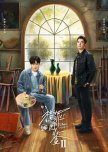This review may contain spoilers
Unlike any other crime drama
Under the Skin (1-2) is a unique and fascinating police and crime drama. The heavy focus on aethetics and ambiance makes it different from the conventional police procedural dramas. It doesn't try to be realistic and isn't, in the way the crimes are solved.
Producer Zhang Yiyun explained:
“Traditional crime dramas often focus on realistic styles, hardcore reasoning, and strong plots to tell stories. But we’ve been exploring how to create a non-traditional crime drama in terms of narrative style, visual aesthetics, and thematic expression. For example, we avoid overly complicated cases, gruesome criminal methods, or overly brain-twisting reasoning processes. Instead, we focus on the dramatic changes in character fates and relationships, using them as the core suspense and plot twists. The show emphasizes the emotions and humanity behind the cases.”
Much of the drama revolves around forensic artist and psychological profiler Shen Yi's thought processes and observations, which he expresses in visual form in his drawings. Captain Du Cheng is the more solid bread and butter police. Their teamwork and differences are enjoyable and the essence carrying the drama which consists of episodic cases.
The pacing is excellent. When the most interesting aspects of a criminal or a case are revealed, the plot moves very quickly on to a new case.
I enjoyed S2 even more than S1, bc they really went head on to unchartered waters. There was an even heavier focus on psychology, aesthetics and cinematography. Some scenes are utterly poetic, like the garbage magic garden (case 2), the streamer girls' doll room, and the wedding-that-was-cancelled decorations.
We learned more about how Shen Yi did his psychological analyses. The scenes with Shen Yi getting face to face with suspects in their own environments, encouraging suspects to open up and tell their stories, telling allegorical stories to them, explaining the meaning of artifacts in their homes, are my favorite ones. Priceless, really.
Shen Yi was the key character this season. The police chiefs were hoping that Shen Yi's insights into the human psyche and way of interpreting traces could be turned into a manual that helps also other police in psychological profiling. Shen Yi's writing of is the "Human Atlas" that is talked about in the last episodes. In the end Shen Yi's art, his "portraits of the heart" as the second level of portrait drawing, constitute this atlas.
The cases I enjoyd most are the AI chatbot case, the opera case and gene editing case.
The last case about gene editing was again very realistic, as was the AI chatbot case. The means for tampering genes with the CRISPR scissors already exist and gene therapies are introduced without much or any long-term testing. Although I absolutely hated it when Shen Yi didn't seem to dispute the Fenk Kai Yi the Mad Scientist's claim that all humans are by nature evil. But he was actually just listening and making his own observations and conclusions, as always. In the last episodes Du Cheng also finally had the opportunity to shine, something I had been wanting to see more. In the last episodes he emerges the strong pillar that he was in S1. The moment when he takes SY off the case bc derailment in wrong direction, was very satisfactory. The friendship between the Mad Scientist and SY on the other hand was difficult to swallow, as it made SY look weaker. As if he had actually been choosing and believing the freak. I wanted to yell "go back to your teammates" at the screen.
But the season ended beautifully with SY and DC honestly talking things out and summing up how they complement each other. Those last dialogues were exceptionally fine writing. I'm ready for S3 and even more experimentation from the writer and producers. The team made a fantastic drama. As for the the last scene (SY stabbing DC), I think the meaning was again to say that within every human being is both good and evil and that they'll explore this further in S3.
Zhang Lai said: "Writing about crime is not to showcase evil, but more importantly, to explore the multifaceted nature of humanity. Good and evil stand side by side, but love is the antidote to redemption, and the law is the thunderbolt that punishes evil. This is our ultimate message."
Producer Zhang Yiyun explained:
“Traditional crime dramas often focus on realistic styles, hardcore reasoning, and strong plots to tell stories. But we’ve been exploring how to create a non-traditional crime drama in terms of narrative style, visual aesthetics, and thematic expression. For example, we avoid overly complicated cases, gruesome criminal methods, or overly brain-twisting reasoning processes. Instead, we focus on the dramatic changes in character fates and relationships, using them as the core suspense and plot twists. The show emphasizes the emotions and humanity behind the cases.”
Much of the drama revolves around forensic artist and psychological profiler Shen Yi's thought processes and observations, which he expresses in visual form in his drawings. Captain Du Cheng is the more solid bread and butter police. Their teamwork and differences are enjoyable and the essence carrying the drama which consists of episodic cases.
The pacing is excellent. When the most interesting aspects of a criminal or a case are revealed, the plot moves very quickly on to a new case.
I enjoyed S2 even more than S1, bc they really went head on to unchartered waters. There was an even heavier focus on psychology, aesthetics and cinematography. Some scenes are utterly poetic, like the garbage magic garden (case 2), the streamer girls' doll room, and the wedding-that-was-cancelled decorations.
We learned more about how Shen Yi did his psychological analyses. The scenes with Shen Yi getting face to face with suspects in their own environments, encouraging suspects to open up and tell their stories, telling allegorical stories to them, explaining the meaning of artifacts in their homes, are my favorite ones. Priceless, really.
Shen Yi was the key character this season. The police chiefs were hoping that Shen Yi's insights into the human psyche and way of interpreting traces could be turned into a manual that helps also other police in psychological profiling. Shen Yi's writing of is the "Human Atlas" that is talked about in the last episodes. In the end Shen Yi's art, his "portraits of the heart" as the second level of portrait drawing, constitute this atlas.
The cases I enjoyd most are the AI chatbot case, the opera case and gene editing case.
The last case about gene editing was again very realistic, as was the AI chatbot case. The means for tampering genes with the CRISPR scissors already exist and gene therapies are introduced without much or any long-term testing. Although I absolutely hated it when Shen Yi didn't seem to dispute the Fenk Kai Yi the Mad Scientist's claim that all humans are by nature evil. But he was actually just listening and making his own observations and conclusions, as always. In the last episodes Du Cheng also finally had the opportunity to shine, something I had been wanting to see more. In the last episodes he emerges the strong pillar that he was in S1. The moment when he takes SY off the case bc derailment in wrong direction, was very satisfactory. The friendship between the Mad Scientist and SY on the other hand was difficult to swallow, as it made SY look weaker. As if he had actually been choosing and believing the freak. I wanted to yell "go back to your teammates" at the screen.
But the season ended beautifully with SY and DC honestly talking things out and summing up how they complement each other. Those last dialogues were exceptionally fine writing. I'm ready for S3 and even more experimentation from the writer and producers. The team made a fantastic drama. As for the the last scene (SY stabbing DC), I think the meaning was again to say that within every human being is both good and evil and that they'll explore this further in S3.
Zhang Lai said: "Writing about crime is not to showcase evil, but more importantly, to explore the multifaceted nature of humanity. Good and evil stand side by side, but love is the antidote to redemption, and the law is the thunderbolt that punishes evil. This is our ultimate message."
Was this review helpful to you?


 9
9





















